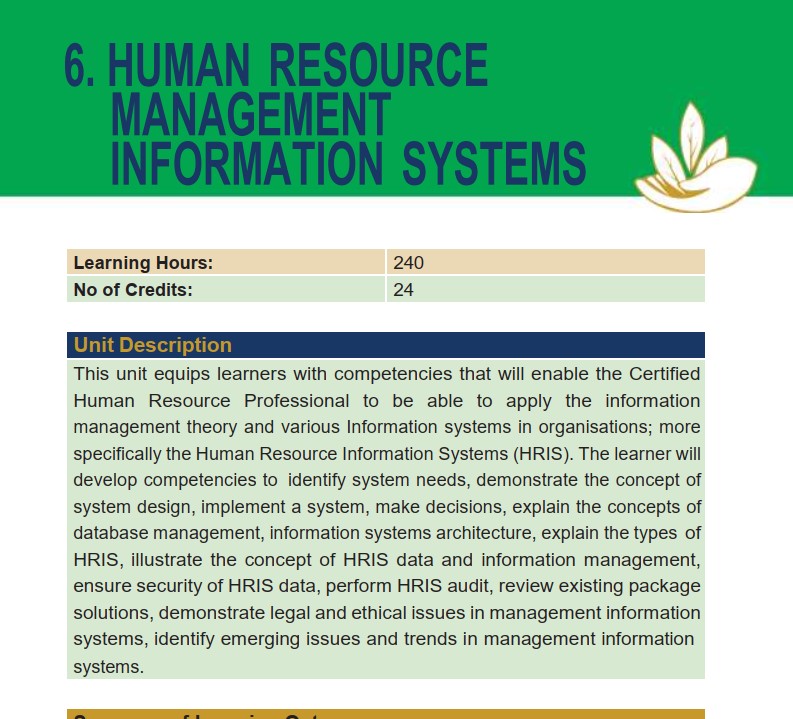
Topics
1. Information Management Theory & Practice
1.1 Introduction to information management theory
1.2 Information management concepts
1.3 Information management theories
1.4 Purpose of information management
1.5 Information management process
1.6 Information management tools
1.7 Information management strategies
1.8 Benefits and challenges in information management
2. Information Systems in Organisations
2.1 Introduction to information systems
2.2 Importance of information systems
2.3 Types of information systems
2.4 Features/components of information Management systems
2.5 Roles and responsibilities of information System users
2.6 Business processes and their relationship to information systems
3. Human Resource Information Systems
3.1 Introduction to human resources information systems
3.2 Role of HRIS in human resources management
3.3 Capabilities of HRIS
3.4 HRIS – System, model and application
3.5 Transforming human resources functions through HRIS
3.6 HRIS implementation: The Who, the What, then When, the Why and the How
3.7 HRIS and continual learning
3.9 Impact of HRIS on organisation efficiency
4. System Needs Identification
4.1 Introduction to systems needs identification
4.2 Process of systems needs identification
4.3 Systems needs analysis
4.4 Strategies for determining needs
4.5 User identification
4.6 User needs assessment
4.7 Needs classification
4.8 Needs prioritisation
4.9 Business processes mapping
5. System Design
5.1 Introduction to system design
5.2 Design methodologies
5.3 Steps in system design
5.4 Key considerations in system design
5.5 System usability
5.6 Graphical design
5.7 Analytical design
5.8 Challenges in system design
6. System Implementation
6.1 Introduction to information systems implementation
6.2 Information system implementation plan
6.3 Information system implementation stages
6.4 Information system implementation process
6.5 Information system implementation strategies
6.6 Information system implementation methods
6.7 Monitoring and evaluation
6.8 Information system implementation challenges
6.9 Overcoming implementation challenges
6.10 Benefits of information systems implementation
7. Decision Making
7.1 Introduction to decision making
7.2 Process of rational decision making and problem solving
7.3 Role of management information system in Decision making
7.4 Decision support systems
7.5 Satisfying decision-making
7.6 Evolutionary decision-making and problem- solving
7.7 Fair administrative action
7.8 Benefits and challenges in decision-making
10. Types of HRIS
10.1 Introduction to HRIS types
10.2 Different HRIS solutions
10.3 Applicant tracking system
10.4 Payroll
10.5 Benefits
10.6 Attendance
10.7 Learning and development
10.8 Performance management
10.9 Employee data analytics
10.10 Succession management
10.11 Employee self-service
10.12 HRIS tools
10.13 Benefits and challenges of HRIS
10.14 Overcoming HRIS challenges
10.15 Emerging issues in HRIS
11. HRIS Data and Information Management in the Work Place
11.1 Introduction HRIS data and information management
11.2 Role of HRIS data in human resources management
11.3 Components of HRIS database
11.4 Data sources for HRIS
11.5 Data management in HRIS
11.6 Importance of HRIS data management
11.7 Factors to consider in selecting HRIS database
11.8 Features of HRIS database
11.9 Benefits and challenges in HRIS data and information management
11.10 Overcoming the challenges in HRIS data and information management
11.11 Emerging issues in HRIS installation and management
12. Data and Information Security in HRIS within an Organisation
12.1 Introduction to data security in HRIS
12.2 Keeping data secure during implementation of HRIS
12.3 HRIS data entry
12.4 Objectives of data and information security in HRIS
12.5 Skills required in HRIS data security
12.6 HRIS installation process
12.7 Data security threats
12.8 Principles of using mobile HRIS applications
12.9 Benefits and challenges in data and information security in HRIS
12.10 Overcoming the challenges in data and information security in HRIS
13. HRIS Audit
13.1 Introduction to HRIS auditing
13.2 Meaning, features and objectives of HRIS audit
13.3 HRIS auditing process
13.4 Steps in HRIS audit
13.5 Records in HRIS
13.6 HRIS research
13.7 Benefits and challenges in HRIS auditing
13.8 Overcoming the challenges in HRIS auditing
13.9 Trends in HRIS auditing
14. Reviewing existing package solutions
14.1 Introduction to existing package solutions
14.2 Benefits of reviewing existing package solutions in HRIS
14.3 Selecting and successfully installing HRIS package solutions
14.4 Benefits and challenges of package solutions in HRIS
14.5 Overcoming the challenges of package solutions in HRIS
14.6 Trends in HRIS package solutions
15. Legal and Ethical Issues in Management Information Systems
15.1 Introduction to legal and ethical issues in management Information systems
15.2 Personal privacy
15.3 Access right
15.4 Harmful actions
15.5 Patents
15.6 Copyright
15.7 Trade secrets
15.8 Liability
15.9 Legal and ethical issues in information technology
15.10 ICT moral responsibilities
15.11 Benefits and challenges of ICT
16. Emerging Issues and Trends in Management Information Systems
